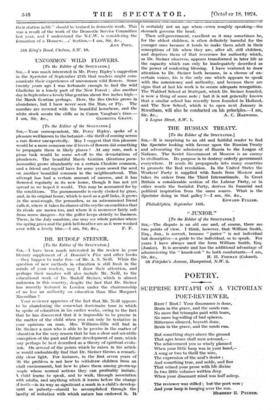DR. RIJDOLF STEINER.
[To the Editor of the SPECTATOR.] SIR,—I have been much interested in the review in your literary supplement of A Dominie's Five and other books —they happen to make five—of Mr. A. S. Neill. While the question of new methods in education is still fresh in the minds of your readers, may I draw their attention, and perhaps their number will also include Mr. Neill, to the educational work of Dr. Rudolf Steiner, which is almost unknown in this country, despite the fact that Dr. Steiner has recently lectured in London under the chairmanship of no less an authority on education than Miss Margaret Macmillan ?
Your reviewer approves of the fact that Mr. Neill appears to be abandoning the somewhat doctrinaire tone in which he spoke of education in his earlier works, owing to the fact that he has discovered that it is impossible to be precise in the matter of the child when you can only be tentative in your opinions on man. Mrs. Williams-Ellis will find in Dr. Steiner a man who is able to be precise in the matter of t..ducation for the very reason that he has a clear and scientific aonception of the past and future development of man, which tnay perhaps be best described as a theory of spiritual evolu- tion. On several of the points which he raises in his article le would undoubtedly find that Dr. Steiner throws a remark- ably clear light. For instance, in the first seven years of ife the problem is not how to withdraw children from an adult environment, but how to place them among grown-up 3eople whose normal actions they can profitably imitate. N. child learns to speak, and to walk, through association with adults, and anything which it learns before the change af teeth—in its way as significant a mark in a child's develop- ment as puberty—should be accomplished through the heulty of imitation with which nature has endowed it. It
is certainly not an age when—even roughly speaking—the stomach governs the head.
Then self-government, excellent as it may sometimes be, for the oldest children, is often definitely harmful for the younger. ones because it tends to make them adult in their conceptions of life when they are, after all, still children, and deprives them of that reverence for authority which, as Dr. Steiner observes, appears transformed in later life as the capacity which can only be inadequately described as the power of conferring blessing. I have ventured to draw attention to Dr. Steiner both because, in a chorus of un- certain voices, his is the only one which appears to speak with the consistency and authority, and because there are signs that at last his work is tu secure adequate-reef:ignition. The Waldorf School at Stuttgart, which Dr. Steiner founded, is now a thing of some note ; but it is not generally known that a similar school has recently been founded in Holland, and The New School, which is to open next January in Streatham, will also be conducted on his principles.—I am, 2 Lupus Street, S.W. 1.


























































 Previous page
Previous page